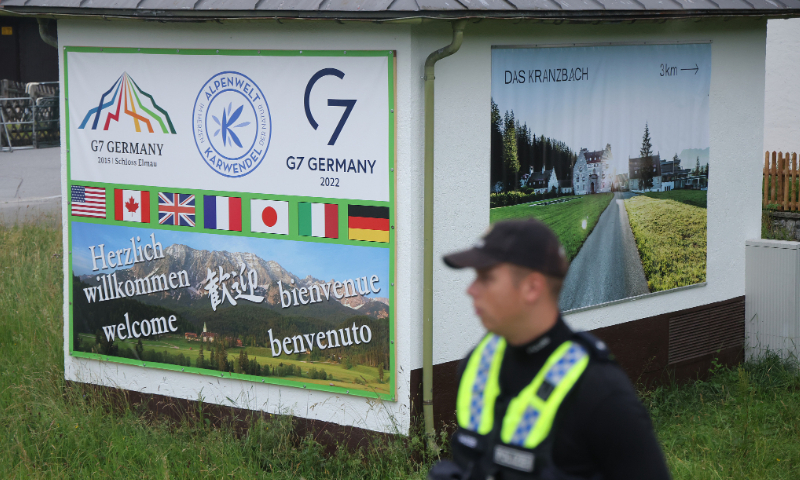
A policeman stands next to a billboard for the G7 summit on June 28, 2022 near Garmisch-Partenkirchen, Germany. Photo: VCG
The Group of Seven (G7) summit kicked off this week in Germany and already the format has revealed itself to be an exclusive club of rich countries, not only because of the fact that it literally used to be the G8, having excluded Russia in 2014, but because of the toxic and fundamentally out-of-touch policies.
For one, G7 leaders announced $600 billion by 2027 for infrastructure projects around the world, called the Partnership for Global Infrastructure and Investment (PGII). This is not a very delicate rebuttal to China's Belt and Road Initiative (BRI) and misses the mark in so many ways, not least because China's BRI had already completed over $600 billion in projects by 2019.
But more than that, development is not a zero-sum geopolitical game. The trajectory of world history, at least until now, is that global standards of living have generally risen across the board, largely owed to technological advancements over time.
Of course, this is not entirely the case in the United States. The standard of living is decreasing for new generations of Americans. Washington has just this week dialed the clock back decades for its citizens by overturning women's right to an abortion, setting the stage for further degradation of civil and human rights. Under these circumstances, it is not surprising that the US-led G7 format is not in line with current realities and conditions.
On top of this, the US and its G7 bedfellows continued this exclusionary attitude by finalizing new sanctions on Russia and announcing more military aid to Ukraine. Rather than providing the offramps necessary for a peaceful diplomatic resolution to the ongoing conflict, the G7 has demonstrated a disturbing commitment to "punish" Russia for its "special military operation."
Inevitably, this approach will likely turn the ongoing conflict in Ukraine into a protracted affair, which will destroy the country and rattle the global economy, particularly in Europe.
It should be noted that only a few governments, which represent an even smaller fraction of the global population, actually support this. It shows again how out-of-touch and irrelevant to the genuine international community the G7 format is.
Juxtapose this with the recent summit of the BRICS (Brazil, Russia, India, China and South Africa), which had a unifying outcome. BRICS countries refrained from interference in the ongoing conflict and its members refused to join Western-led unilateral sanctions. The entire format itself is built on the basis of economic and financial security, which is why members of the group have consistently pushed for an alternative to the Bretton Woods system and a new global reserve currency.
The G7 has continually exposed itself as an instrument of the US and this latest summit is no exception. It is clear that besides the US, the other six members of the group are irrelevant. They were given a list of what Washington has agreed on and rubber stamped it without question while saying the entire process is a discussion. The outcomes of the summit are pre-determined.
Meanwhile, formats like the BRICS are more interesting and far-reaching. This is not an exclusive club, and through the BRICS+ format, this inclusive group has been spearheading the development of the Global South. That is why the BRICS started the New Development Bank in 2014, which is becoming a viable replacement for the Western-led International Monetary Fund and the World Bank .
The late American comedian George Carlin once said about politics: "It is a big club… and you ain't in it." While that is certainly the case in Washington and its vassal states, the global situation is changing. The world is quickly becoming more inclusive, more politically diverse and the proverbial playing field is being leveled. Gains in development, democracy and human rights are being led now by the traditional losers: the Global South.
In this respect, the G7 has little to offer. In fact, promises have continually been made to help invest in the Global South with little in the way of action. The Global South, led by groups such as the BRICS, is becoming a fully autonomous coalition that does not need handouts from the exclusive G7 club.
The author is a Prague-based American journalist, columnist and political commentator. opinion@globaltimes.com.cn




